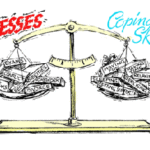
Ever see a pie chart like this, or can you at least envision one, wherein a partner of yours (or God-forbid, you), expect a majority control of a startup? I get asked all the time, about how to handle retaining control when it was my idea or how to deal with a cofounder who wants too much.
My Cofounder wants 51%. What should I do?
We can learn a lot about entrepreneurs through the words they use to explain their situation. From asking about funding for an MVP, we can tell they’ve been misled. When talking about patents and their unique idea, we can tell they’re likely misinformed or overconfident. When they distinguish wants from needs or convey (as is the case here) that they’re working with someone unreasonable, we can tell their team will likely fall apart and cause their failure.
Before exploring the point of my article today, better founder agreements, let me explain what led me to considering that we need better agreements.
“Wants to take”
Well, what you should do without bothering further is quit.
Such a person, expecting they are entitled, is not a partner, that’s a wantrepreneur who is selfish, and frankly, ignorant of how this works – you should just run, but I know most of you won’t.
No one gets 51% outright. Certainly not for an idea, nor the vision, the strategy, a plan, nor the roadmap. It’s highly unlikely that anyone deserves 51% under any circumstances other than being the sole founder (which no, does not mean they own 100%).
If you want to play it smart, take their so-claimed brilliance and go start the company that should exist thanks to the idea, with a team more capable, collaborative, and experienced.
Startup founders earn equity for the following reasons:
- Bringing resources – team, money, or both – this is usually considered the CEO
- Developing the market – this is the CMO
- Developing the solution – this is typically a CTO, but that depends on what you’re doing
No one gets anything for talking about it. No one gets equity for bringing a team to do it for them.
EVERYONE must do something, and execute their responsibility, to get it, all by themselves.
We do this by setting a cliff (a point in the future when everyone earns some of the shares, and from then on earns more over time; with no one getting anything until then). You protect everyone else and the startup from the failure of a person by putting that in writing PLUS the fact that they are responsible for alone delivering the OUTCOME of their work expected.
Startup Founder Agreements are Failing Teams
I put outcome in big letters so it’s clearer – this does not mean putting in the work, it does not mean coding, promoting, or talking to investors, it doesn’t even mean doing what you said you’d do, it means the results of the work manifest, are productive, are effective, and are valuable.
- We have the money or more people working on the team
- We have growth, customers, partners, and investors – outcome, not work being done
- We HAVE the fully developed solution, as expected – outcome
If people fail to do this, they are removed from the team. No hard feelings. No equity other than what is earned to that point.
Excuses are not allowed. If they don’t deliver but you’re willing to let them keep trying, you push OUT the cliff to a later date ? If they don’t deliver the outcome when expected, they do NOT get their equity, they can continue working to deliver it, for nothing, with a new cliff set when they’ll start earning something.
Let me be clear too, these are the only 3 valuable roles in the company!
NOTHING else matters. These roles are not interdependent though they must work together… what that means is #1 can’t claim they didn’t deliver because either or both of other two failed to do so. That doesn’t matter because you don’t then get to start earning equity without you having delivered! They won’t get theirs; you don’t get yours. Simple.
Yes, raising capital might be dependent on growth or a delivered solution, but that doesn’t mean you start getting to earn equity without delivering your piece, just because they didn’t deliver theirs.
Marketing can do marketing without the other two
Developers can deliver a solution without the other two
Granted, not well, but it is possible, so no one gets to establish an excuse that they can’t do their job because the others aren’t – people that do that aren’t founders, they’re employees of a company with resources.
This is why, as should be the case, that while you’re not dependent on one another, you also are dependent on one another.
- Marketing can’t do their job well if the vision for the company is off somewhere else. They certainly can’t get customers is the solution is junk.
- Developers won’t create the ideal solution without marketing
- The CEO fairly can’t really get funding or more on the team, if there isn’t growth or a solution
Do the work, deliver the results, and earn your equity; if you don’t, you don’t have anything anyway.
I’m curious if you’re looking at the fact that team’s falling apart are the leading cause of startup failure, and if you are interested in or working on agreements that might better protect the venture itself, or the team committed and delivering, from a bad apple. Let me know!






Paul, very written, helpful startup advice. Thanks for sharing. Sure do agree!
From your article, it seems you’re proposing a more results-oriented partnership agreements. The only part of a partnership agreement that has clear value, is money contributed. Anything else, such as a promise to do work – is a big question mark. Even if they deliver code – will it actually work? Will it, actually be good?
I’d argue, actually a BIG reason entrepreneur partnerships fail – is because entrepreneurs are partnering too early. Get as far as you can go solo, and THEN partner either for money or labor. Your negotiation position will be better, things will be farther along, the work needing to be done will be clearer to perspective partners, you’ll be in a position to give away less equity. A lot of entrepreneurs fall well short of their maximum potential solo, and then expect a partner to bail them out in some way, either financially or skill-wise. It almost never works out.
Mark Biw I’m not proposing anything with certainty, I’m just pushing the question and trying to lay out why we should be doing things differently.
Clear value contributed isn’t just money, nor is a promise to do work. Part of the problem is that some ecosystems think it is (that we need to have revenue to prove something; that people should get paid; that we need funding – money — that’s not how startups work). There is no money. There is no cash flow, no funding, and no customers. Now what?
The delivery of a team, growth, or a capable solution, are all objectives that can be delivered WITHOUT money. These are the things that RESULT in funding or customers; too many have it backwards.
I don’t help anyone anymore as a Texan because terms are the dealbreaker because the enterprise cant incentive innovation properly x.
Ajay Desai regretfully, I’ve run into the same issue far too often in Texas. I happily worked for equity or even volunteered, frequently, in some other regions, because it paid off.
Coincidentally, my next article explores this
This read right here is better than half the classes at most incubators and 1000% better than any entrepreneur course at a university.
Paul O’Brien Okay thanks for the clarification. It’s actually a good starting point- no team no money no product. Because you can focus on what really matters in a certain industry minus all the bureaucracy and overhead. If you can do more with less or about the same, then your competitors are certain to be dinosaurs. But creativity is absolutely essential – startups are a game for creative people.
Does it even matter what people that don’t understand this stuff think? What matters Imo is only what the customers and people building the solutions think.
Mark Biw I won’t argue with you but my experience with successful vs. failed startups since the 90s has been that when founders think the only thing that matters is customers, they fail.
Every successful venture I’ve been with worried about customers second and viable solutions to the market first. “We’ll figure out how to make money” was a common mantra, because everyone knows that if you are doing something of value, customers will pay for it. Focus on customers causes blindness to competitors, threats, trends, and whether investors, partners, and the sector, will support you or eat you alive.
Paul O’BrienI don’t believe we disagree anyway. By focusing on customers I mean delivering solutions to the customer’s problems while ignoring the customer service minutiae. I think that’s what helps them truly, gifting them a viable solution – not at implementing all their demands or such!
Tina Hui you and I have talked about this before…
Zach Hanna I’ve talked with a few people about it… would love to do something intentional to fix it (cc Tina Hui)
This has been a big problem for a long time – I’ve coached many teams through it.
Your goal is a good one – equity for outcomes – it’s not easy to accomplish. Control mechanisms can be as divisive as equity splitting.
Vesting is a powerful tool founders can use, but there are other challenges it doesn’t easily solve. For example, what if some of the team has cash and some don’t? What if some need cash and some don’t? Who decides who’s succeeding and who isn’t?
Not an easy problem – if it were, it would have been solved already.
We would all benefit from a set of standard templates like we have for VC & angel investments, but I haven’t seen any become widespread.
Matt Cohen a thesis though? I hasn’t been solved already because Lawyers don’t know how, no one benefits directly from solving it, and for a solution to catch on, it would require adoption.
I could see something like the FAST Agreement (for advisors) being applied.
Two considerations
1. Individual performance
2. Team performance
Individual performance is tied to a set of options to choose from given the role of the individual (CEO / CMO / CTO). This helps steer founders to what the expectations of deliverables should be.
CEO – $500k seed funding from 2 investors
CMO – # or % site growth, app downloads, social media audience, or newsletter subs
CTO – MVP with % retention rate or referral rate
All of that clearly defined with metrics.
Cliff is hitting that – not a matter of time. Hit it early? Who cares, yay!
Vest is some measurable improvement upon that merely to establish that the work continues
Then we have the second consideration though because while each of those can work independently, they won’t work well without working together. You need both considerations to establish that you can do the role without the other, so do it, but that you also are interdependent.
What you do is cut the equity granted by a certain percentage IF you fail to hit your milestone; reallocated as a share allocation based on the original expecations so that the others gain a bit for the work they did, falling short because of you. e.g. Instead of 30%, you get 25% because you didn’t hit it entirely/on time…
* 1% gets allocated to the other two founders
* 2% remains in reserve so that you can still earn it
Where the 1% reallocation is determined by the original splits (so if one person originally was granted more, they might get a bit more of the reallocation)
I’m just spitballing here… have talked about it a lot too. I do truly think that the reason it hasn’t been done has had more to do with Startup Lawyers preferring Delaware – it’s what everyone knows and uses. Changing that requires more weight than a few people proposing better.
Very true. Effort does not equal value. Your excuse might be valid, but it does not move you forward.